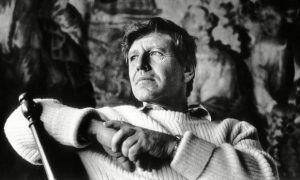Jonathan Freedland in The Guardian:
 On Friday afternoon, a text arrived from Israel letting me know of the death of Amos Oz, hailed for decades as that country’s greatest novelist. “The last, best voice of an Israel that is all but gone,” it read. Oz himself would doubtless have found a way to wave aside such talk, dismissing it as melodramatic. But there’s truth in it. For he was indeed the embodiment of a particular Israel, one that dominated in the first years of the state’s life but which has steadily receded to the margins. To his internal critics, he was the face of the mainly-Ashkenazi, European Jewish elite that built the country, a bleeding-heart liberal constantly scolding the nation for its ongoing occupation of Palestinian lands, a founder of the Peace Now movement who never stopped demanding his fellow Israelis behave more wisely and more justly. More than once he was denounced as a traitor, an insult he once told me he regarded as nothing less than “a badge of honour”, putting him in the same company as Jeremiah, Abraham Lincoln and Israel’s first prime minister, David Ben-Gurion.
On Friday afternoon, a text arrived from Israel letting me know of the death of Amos Oz, hailed for decades as that country’s greatest novelist. “The last, best voice of an Israel that is all but gone,” it read. Oz himself would doubtless have found a way to wave aside such talk, dismissing it as melodramatic. But there’s truth in it. For he was indeed the embodiment of a particular Israel, one that dominated in the first years of the state’s life but which has steadily receded to the margins. To his internal critics, he was the face of the mainly-Ashkenazi, European Jewish elite that built the country, a bleeding-heart liberal constantly scolding the nation for its ongoing occupation of Palestinian lands, a founder of the Peace Now movement who never stopped demanding his fellow Israelis behave more wisely and more justly. More than once he was denounced as a traitor, an insult he once told me he regarded as nothing less than “a badge of honour”, putting him in the same company as Jeremiah, Abraham Lincoln and Israel’s first prime minister, David Ben-Gurion.
Outside the country, however, he could make diaspora Jewish audiences swoon; they saw him as a pin-up for the Israel of their dreams. Ruggedly handsome, his face battle-scarred by service in Israel’s 1967 and 1973 wars, he could have been a model of the “new Jew” the first Zionists longed to forge in the Mediterranean sun. They wanted the new Israeli to be a soldier, farmer and poet. Oz was all three, a member of Kibbutz Hulda where he took his turn picking fruit and washing dishes, turning over the proceeds of his novels to the collective coffers. In a way, that man was Oz’s first invented character. He was not born an Oz, but a Klausner, growing up not on a kibbutz, but in Jerusalem. His father was a scholar and librarian; the future novelist was raised in what he called “a house full of footnotes”. He fled to the kibbutz aged 15, renaming himself Oz – Hebrew for strength.
More here.
